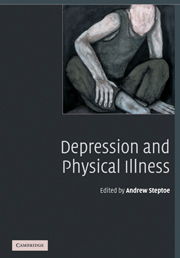Book contents
- Frontmatter
- Contents
- List of contributors
- Preface
- Part 1 Introduction to depression and its determinants
- Part 2 Depression and specific health problems
- Part 3 Biological and behavioural processes
- 12 Inflammation, sickness behaviour and depression
- 13 The hypothalamic–pituitary–adrenal axis: cortisol, DHEA and mental and behavioural function
- 14 Depression and immunity: biological and behavioural mechanisms
- 15 Smoking and depression
- 16 Depression and physical activity
- 17 Depression and adherence to medical advice
- Part 4 Conclusions
- Index
- References
17 - Depression and adherence to medical advice
from Part 3 - Biological and behavioural processes
Published online by Cambridge University Press: 17 September 2009
- Frontmatter
- Contents
- List of contributors
- Preface
- Part 1 Introduction to depression and its determinants
- Part 2 Depression and specific health problems
- Part 3 Biological and behavioural processes
- 12 Inflammation, sickness behaviour and depression
- 13 The hypothalamic–pituitary–adrenal axis: cortisol, DHEA and mental and behavioural function
- 14 Depression and immunity: biological and behavioural mechanisms
- 15 Smoking and depression
- 16 Depression and physical activity
- 17 Depression and adherence to medical advice
- Part 4 Conclusions
- Index
- References
Summary
The coexistence of depression and medical illness has been the focus of a great deal of attention in the past several years. Depression appears to occur in at least 25% of medical patients, although estimates vary based on measurement criteria, type and stage of medical disease, and level of depressive severity [1, 2]. Depression has also been associated with poorer health outcomes in these diseases. Depression may influence the development and progression of diseases directly via physiological pathways or indirectly via behavioural pathways [3].
Adherence to treatment regimens is one possible behavioural pathway by which depression affects physical health. Adherence is the degree to which a person's behaviour (e.g. taking medications, attending treatment sessions, executing lifestyle changes) coincides with medical or health advice [4]. Adherence is critical for the prevention and treatment of medical diseases. Unfortunately, adherence is less than optimal across a wide range of medical regimens [5]. Individuals who are depressed may be less likely to adhere to various aspects of their treatment regimens, and this lack of adherence may produce poorer health outcomes.
There is a large literature on predictors of adherence. A substantial number of variables have been associated with adherence, but findings across studies have been inconsistent [6]. Depression has emerged as one of the few promising predictors of treatment adherence among medical patients [7]. There are many reasons to hypothesise that depression may negatively influence an individual's willingness and capacity to adhere to a treatment regimen.
Keywords
- Type
- Chapter
- Information
- Depression and Physical Illness , pp. 369 - 394Publisher: Cambridge University PressPrint publication year: 2006
References
- 3
- Cited by



